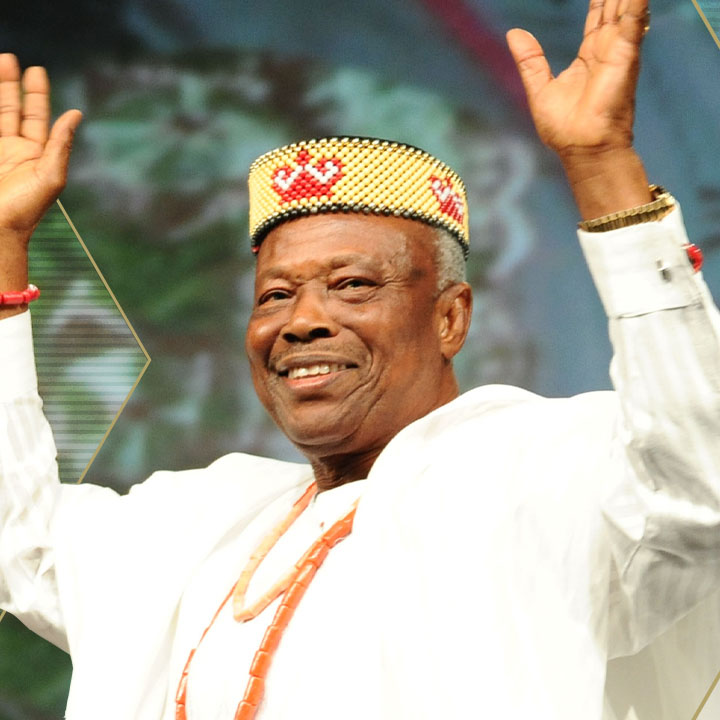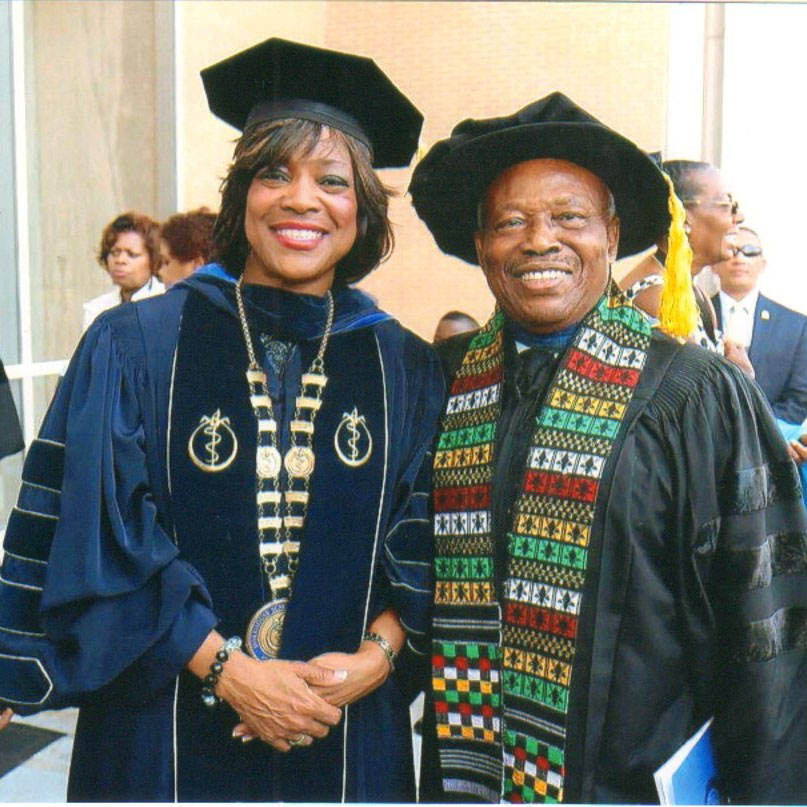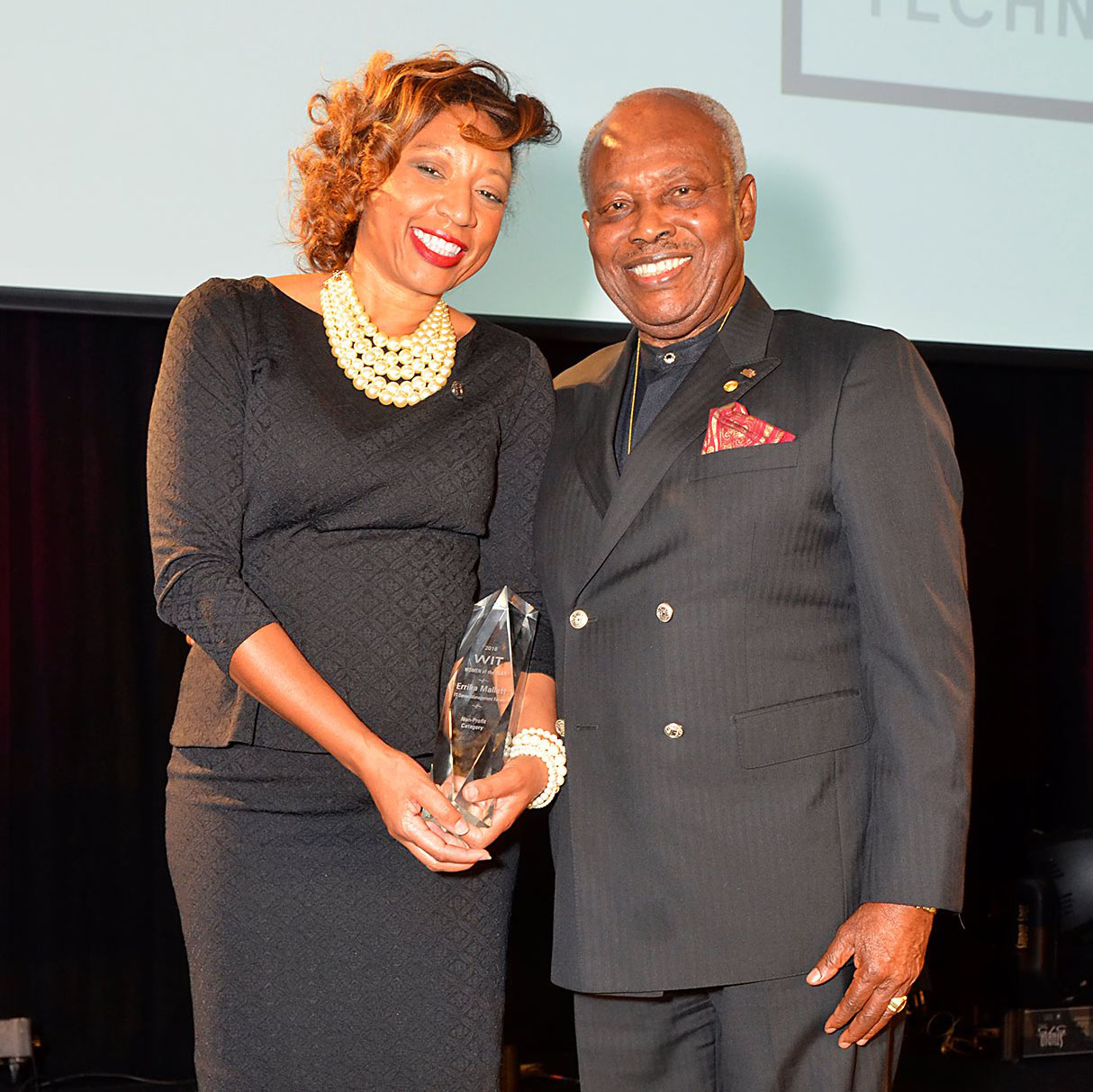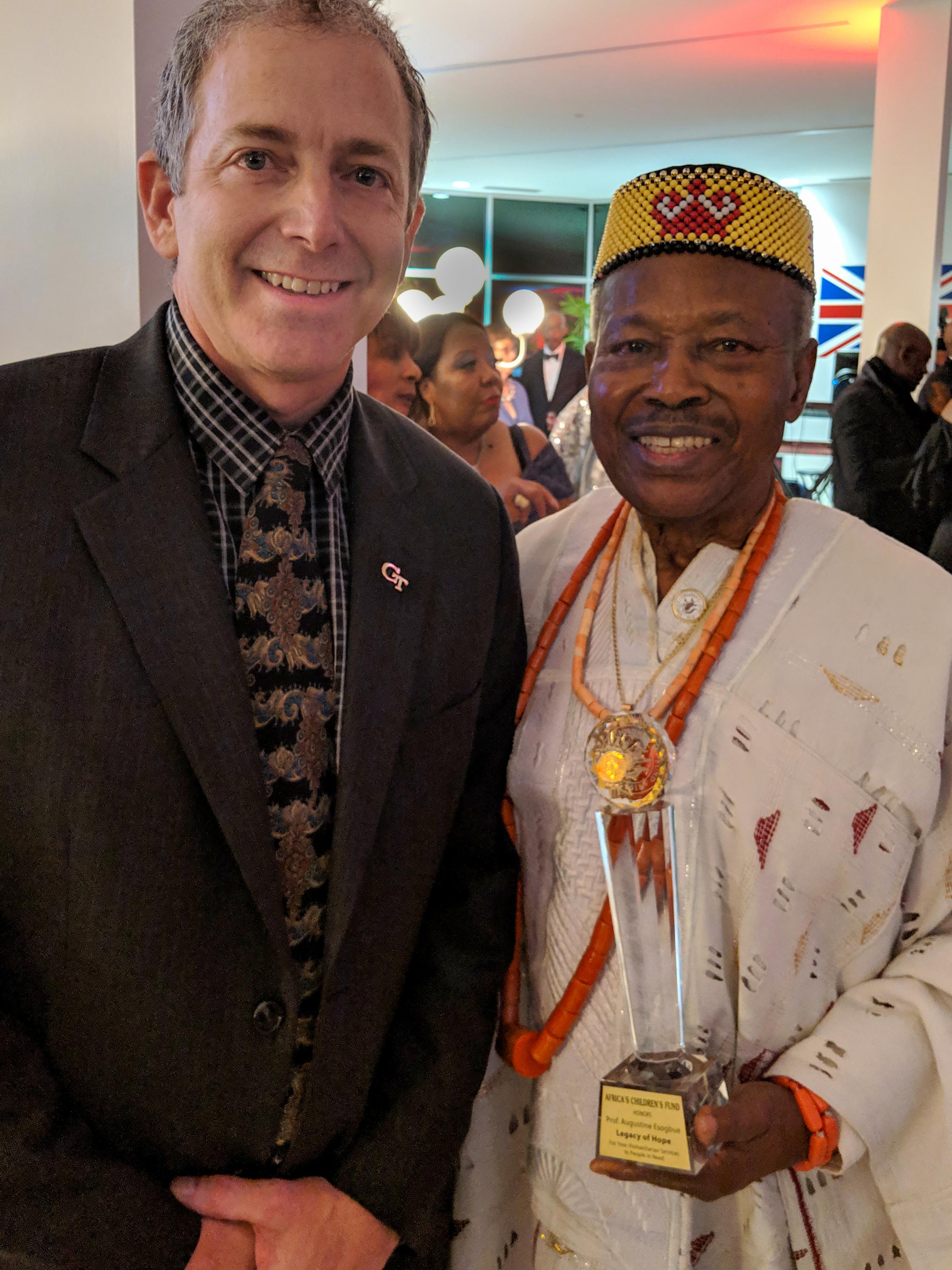Augustine Esogbue has been a trailblazer throughout his academic career. At the top of his grade at the private high school he attended in Nigeria, Esogbue was an early recipient of a highly competitive study grant from the African Scholarship Program of American Universities. This award enabled him to attend UCLA, where he received a bachelor’s degree in electrical engineering (1964), and then go on to earn a master’s degree in industrial engineering (IE) and operations research (OR) from Columbia University (1965).
Esogbue’s research at this time focused on dynamic programming; he also spent a summer at UCLA delving into the nascent field of biotechnology by researching how prosthetic devices could be externally powered. This work attracted the attention of world-famous mathematician Richard Bellman, who offered Esogbue both a research appointment and mentorship at the University of Southern California. In 1968, Esogbue received his doctorate in IE/OR, making him not only Bellman’s first Ph.D. graduate at USC but also the world’s first Black Ph.D. in the field.
The firsts didn’t stop there. As a young professor, Esogbue spent a few years teaching and researching at Case Western Reserve University, where he made breakthroughs in dynamic programming, fuzzy sets, and novel OR applications to such areas as healthcare, water resources and pollution, and transportation and education. This work led to his 1972 election as a Fellow of the American Association for the Advancement of Science.
That same year, Esogbue joined Georgia Tech’s H. Milton Stewart School of Industrial and Systems Engineering (ISyE) as an associate professor, with a joint appointment in the Health Systems Research Center. Promoted in 1977 to full professor, he became the Institute’s first Black faculty member at that level.
“When I arrived at Georgia Tech, I was unaware of its racial composition. I had always been a racial minority, both as a student and as a faculty member, and what mattered to me was the opportunity Tech offered to advance my academic career and to contribute to the development of knowledge,” Esogbue explained. “Most of my colleagues were welcoming and supportive, while others myopically saw me as the solution to Black problems both on and off campus. In Atlanta I was known as ‘the Black professor at Tech.’”
Esogbue’s presence at the Institute quickly caught the attention of the youthful Maynard Jackson, who had been elected the first Black mayor of Atlanta. Through Jackson, Esogbue met civil rights leaders like John Lewis, Julian Bond, and David Franklin, and these experiences opened his eyes to the deep racial disparities in the U.S. As national chairman of the Visiting Lecturers Program of the Operations Research Society of America (ORSA, a precursor to INFORMS), he directed the attention of HBCU students to professional opportunities in the growing field of OR. This effort laid the foundation for a more inclusive ORSA – and later – INFORMS.
He vowed also to use his position at Tech to promote minority representation in STEM fields.
Increasing Diversity at Georgia Tech
At this time, Georgia Tech was on its way to becoming a nationally recognized research institution. Esogbue saw that underrepresented minorities were in danger of being left behind, with the few Black students who were admitted to Tech often dropping out before they could complete their degrees. The National Society of Black Engineers (NSBE) had been recently organized in 1975 at Purdue University to recruit and support Black engineering students, and Esogbue co-founded the Georgia Tech chapter (GTSBE) a few months later.
GTSBE has grown to become the third-largest student group on campus and has won multiple regional and national awards for its excellence. This includes the national 2019-20 Large Chapter of the Year Award, which GTSBE received under then-ISyE student Ndeyanta Jallow’s (BSIE 2020) presidency. Esogbue served as faculty advisor to GTSBE until he retired from ISyE in 2010; he was also NSBE’s longest-serving national advisor (1989-2014). He was elevated to National Advisor Emeritus status (2014) and became the first recipient of the organization’s Golden Torch Award for Lifetime Achievement in Education (1999).
Esogbue’s diversity efforts did not stop with GTSBE. Tech was the first Southern higher-learning institution to integrate peacefully, but its students and faculty were still mostly white and male. As Esogbue recalled in a 2014 NSBE magazine profile, “Georgia Tech was really about to lose its accreditation for federal funds because of the paucity of Blacks in various segments of its community.”
With the backing of then-President Joseph M. Pettit, Esogbue initiated and chaired the Institute’s Affirmative Action (Faculty) Task Force, which developed a systems-based blueprint for increasing the number of minority faculty at Tech. Under his supervision, ISyE student Brenda Gullatt (EES 1976) – who herself was one of Tech’s first Black female graduates – produced quantitative data justifying the 1979 establishment of OMED, the Office of Minority Educational Development. To this day, OMED supports the academic pathways of traditionally underrepresented minorities at the Institute, and the College of Engineering (COE) is the largest producer of Black engineers in the U.S.
The Importance of Mentoring Black Students
Esogbue emphasized Institute-wide programs that developed Black students so they are equipped with the skills to pursue advanced academic degrees or high-level industry positions. He mentored many students who have gone on to highly successful careers.
“Through their intellectual and professional pursuits and their social activism, my students have extended my contributions beyond my wildest imagination,” Esogbue said. “And not only in engineering – societal transformation systems like government, politics, religion, and education. I succeed when my mentees succeed; conversely, I die a slow death when the best of them fails. That’s negentropy, an antithesis of living systems, and is never to be tolerated.”
Esogbue’s mentees include Black academic and industry luminaries such as Dr. Valerie Montgomery Rice (Chem 1983), who is currently serving as the first female president of Morehouse School of Medicine (2014), and Gary May (EE 1985).
May – like his mentor – has achieved a groundbreaking academic career. In 2005, May became the first Black school chair at Tech, helming the School of Electrical and Computer Engineering; in 2011, he was chosen as the first Black dean of COE during the 50th anniversary year of Tech’s integration; and he now serves as the first Black chancellor of the University of California, Davis.
In a 2019 lecture given at Washington State University, May said that his “world opened up through [Professor Esogbue’s] influence. I could see living proof of a Black man finding great success and respect in the engineering field.” And, when President Barack Obama bestowed on May the 2015 Presidential Award for Excellence in Science, Mathematics and Engineering Mentoring, May attributed his accomplishments directly to Esogbue’s impact on his life.
Similarly, Errika Moore (IE 1996) regards Esogbue as a father figure and maintains a close personal relationship with him. She has followed in his footsteps of working to expand racial and gender diversity in STEM fields by promoting Black participation in K-12 STEM-based activities, as well as boosting Black representation in the senior leadership of U.S. technology companies.
Moore has said, “In life we stand on the shoulders of giants, and for me Professor Esogbue was definitely one of those giants. In a space where I, as a Black woman, am still statistically an anomaly, I had the opportunity to see a trailblazer in action and to see the embodiment of Angela Davis’ words: ‘I’m no longer accepting the things I cannot change. I’m changing the things I can no longer accept.’”
Esogbue’s influence was not exclusive to the Black students he taught and advised. When ISyE alumnus Warren Hearnes (Ph.D. IE 1999) – who is white – arrived at ISyE for his doctoral studies, he had just left an Army career that touched on fuzzy logic and neural networks – which would become today's field of machine learning. He discovered Esogbue was researching this field at Georgia Tech, working with the National Science Foundation and NASA, and asked to meet with him.
“In that first meeting, Augustine exhibited the same type of leadership qualities that had been demonstrated to me in the military,” Hearnes recalled. “This was another reason I asked him to be my advisor; he was the type of role model I wanted. He knows how to look at a problem – to break a system into its components, create a decision-making model of it, and turn all this into research. He was also a man of integrity. If Augustine said he would do something, he did it.
“He also set very high goals for me and pushed me to be excellent,” Hearnes added. “What seemed hard at the time turned out to be very beneficial for me. I would not be where I am today without his mentorship.” Hearnes is currently the senior vice president of analytics and data science at Atlanta-based Cardlytics, an advertising platform for financial companies.
An Impactful Life
In retirement, Esogbue – who was designated a professor emeritus by the University System of Georgia Board of Regents in 2012 – has remained involved with initiatives to increase Black achievement and leadership, such as 100 Black Men of America. As Patron of the Association of Nigerian Engineers & Scientists in the Americas, he is guiding a group of mostly immigrant and first-generation STEM professionals by emphasizing excellence, integrity, service delivery, and mentorship.
Esogbue’s awards and professional recognitions are nearly too numerous to name. In 2004, he was elected as the second Black Fellow of INFORMS. Two years later, he received the NASA Distinguished Public Service Medal for contributions to the U.S. space mission, as well as the Nigerian National Order of Merit, which is the country’s highest academic honor.
Esogbue has also been named a Fellow of both the Nigerian Academy of Science and the Nigerian Academy of Engineering (NAE). He chairs the NAE’s worldwide Diaspora Group, which provides the needed linkage between NAE and other world engineering academies and promotes quality assurance, parity, and currency.
The NAE summarizes Esogbue’s accomplishments in shaping generations of Black engineering students in this way: “Professor Emeritus Esogbue’s contributions to engineering education are legendary. He has produced and mentored generations of high-quality scholars and leaders for industry, government, and academia. He has changed the landscape of the engineering population in America with his highly successful programs to cultivate and nurture minority interests in STEM fields.”
When asked to reflect on all he has accomplished and on the impact he has made on so many, Esogbue said, “An integral part of my life has been an uncompromising dedication to excellence in everything. I converted the enormous challenges I faced along the way into opportunities, and my commitment never to accept mediocrity or failure as an option helped me thrive. I was determined to see that Georgia Tech did not miss the opportunity – surrounded as it has been by world-famous civil rights leaders – to enshrine diversity as a fundamental value of the Institute’s culture.
“All of my achievements are dedicated to my family, to my teachers and mentors, and to all my mentees, whose success and thunderbolt-like impacts on society have far exceeded my dreams and expectations,” Esogbue continued. “Georgia Tech is certainly much better today because we believed in the possibility – the necessity – of a diverse community – each person excellent, contributing their God-given talent, and nurtured through mentorship – to raise the profile of the Institute in diverse fields of learning around the world. I am grateful for the opportunity and determination to contribute to this colossal transformational change. To God be the glory.”
More About Professor Emeritus Augustine Esogbue
- Augustine O. Esogbue (INFORMS Biography)
- Augustine O. Esogbue: Mathematicians of the African Diaspora (University of Buffalo)
- Dr. Augustine Eosgbue: Meeting the Mission, in Retirement (NSBE)
- Accomplished Engineering Professor and Alumnus Creates Scholarships (UCLA Samueli Newsroom)
- Alumnus Shines as Systems Engineer and Social Activist (USC Viterbi School of Engineering)
- 75 Years of Industrial Engineering at Georgia Tech: A Brief History (ISyE)
For More Information Contact
Shelley Wunder-Smith
H. Milton Stewart School of Industrial and Systems Engineering




